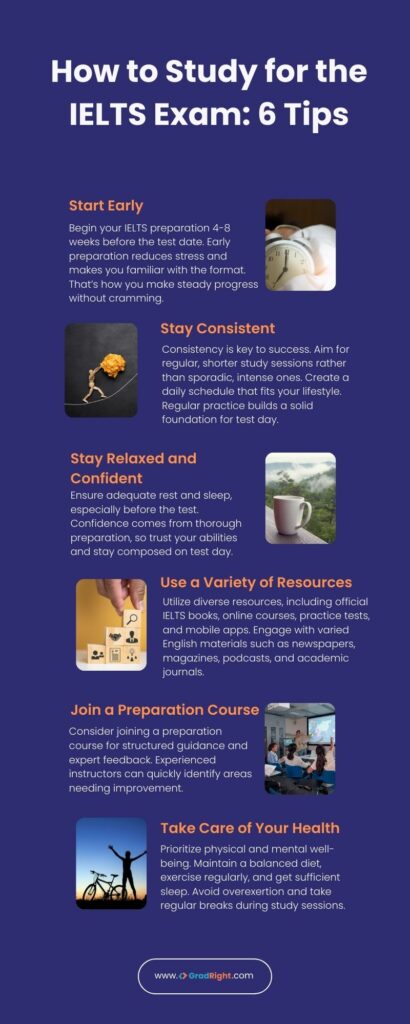How to prepare for IELTS? This is a question that concerns many IELTS aspirants and that is what we will answer in this guide. It is not tough to crack the IELTS and score well. All you need is a focused strategy and a few weeks of dedicated preparation.
In this article, we dive into the key aspects of IELTS exam preparation. We provide valuable tips to help you prepare effectively and get the score you need with ease.

What is the IELTS Exam?
The International English Language Testing System (IELTS) is a very popular English language proficiency test. Last year the test was taken by 4 million people worldwide. It is commonly used for higher education, employment, and migration purposes.
The exam certification is accepted by over 11,500 organizations in more than 140 countries. These include universities and colleges in Australia, the UK, Canada, and New Zealand. Several academic institutions in the USA and Europe also accept IELTS results as proof of proficiency in English.
The exam is managed by the British Council, IDP, and Cambridge Assessment. IELTS evaluates four key language skills: Listening, Reading, Writing, and Speaking.
It is available in both paper-based and computer-delivered formats and provides results on a 9-band scale.
There are two main types of IELTS tests: IELTS Academic and IELTS General Training.
- IELTS Academic
The IELTS Academic test is for those who want to pursue higher education abroad. It assesses your ability to study in English.
The test is required for university or college admissions to undergraduate and postgraduate courses.
- IELTS General Training
The IELTS General Training test is perfect for those who are going to English-speaking countries for work experience, or training programs.
It is also needed for migration to Australia, Canada, New Zealand, and the UK. The test focuses on using the English language in social and workplace contexts.
IELTS exam preparation strategy 2025
IELTS exam preparation can seem like an uphill task. But with the right approach, dedication, and planning, it is possible to achieve your desired score. All that it takes is a few weeks of effort and learning.
It’s time to explore strategies for success. Even for those with exceptional English skills, incorporating our tips and strategies can maximize your performance.
Here are the best IELTS exam preparation strategies for 2025.
- Understand the test format
Before you get down to preparation you have to understand the format of the IELTS exam.
The IELTS test is divided into four sections: Listening, Reading, Writing, and Speaking.
Below is a table summarizing the four sections of the IELTS Academic test. Knowing these thoroughly will boost your confidence and efficiency while preparing:
| Section | Description | Duration |
| Listening | Four recordings of native English speakers followed by questions | 30 minutes |
| Reading | Three long reading passages with tasks. Texts are taken from books, journals, magazines, and newspapers | 60 minutes |
| Writing | Task 1 requires describing visual information (graph, table, chart, or diagram) Task 2 involves writing an essay responding to a point of view, argument, or problem |
60 minutes |
| Speaking | Face-to-face interviews, including short questions, speaking at length about a familiar topic, and a structured discussion | 11-14 minutes |
Familiarizing yourself with the format will allow you to manage your time effectively while preparing.
- Set a study schedule
Now that you know the structure of the test, you need to create a study schedule. This is vital for effective IELTS exam preparation.
Begin by gauging how much time you have before your test date. Divide this time into study periods. Allocate specific times for each section of the test. You need to ensure that all sections are covered adequately.
For example, you might want to dedicate Mondays, Wednesdays, and Fridays to Listening and Reading. On Tuesdays and Thursdays, you could focus on Writing and Speaking.
The weekends are ideal for taking full practice tests. Sticking to a consistent routine for several weeks will bring steady progress.
- Practice mock tests regularly
Regular practice tests are the key to success in the IELTS exam preparation. Use mock tests to familiarize yourself and to identify your weak areas.
These tests help simulate the actual exam environment. Through repeated practice, you get used to the time frame for each section. Aim to complete at least one full practice test each week. Additionally, practice specific skills daily, such as listening to English audio for the Listening section or writing essays for the Writing section.
- Expand your vocabulary
A good vocabulary is worth its weight in gold for the IELTS test. A wide-ranging vocabulary will allow you to score well in the Reading and Writing sections. Make a habit of learning new words and their meaning every day. Then practice using them in sentences.
Use vocabulary lists, flashcards, or apps to aid your learning. Focus on words that are commonly used in academic and formal contexts, since these are likely to be a part of the test. Additionally, pay attention to synonyms, antonyms, and homonyms.
- Develop listening skills
Improving your listening skills is essential for the IELTS Listening section.
Listen to a variety of English audio materials, such as podcasts and news broadcasts. BBC News is ideal for familiarizing yourself with a neutral Western accent.
Pay attention to different manners of speaking, as the test includes recordings from native speakers. Practice identifying and extracting key information from speech, such as numbers, and names, and note them down. Also, try to summarize the main ideas of what you hear to improve your comprehension.
- Read widely
Reading a wide variety of English texts will improve your performance in the Reading section. Include different types of materials in your reading practice. Read newspaper articles, magazine/novels, and academic journals voraciously.
Focus on understanding the main ideas, supporting arguments, and the author’s perspective. Practice summarizing and paraphrasing what you read to improve your comprehension and retention.
- Work on writing
The Writing section of the IELTS test requires you to complete two tasks. The first is describing visual information and the other one is to write an essay.
Practice writing these types of tasks regularly and focus on structure and grammatical accuracy.
- For Task 1, learn how to effectively describe graphs, charts, and processes, with suitable vocabulary and phrases.
- For Task 2, practice writing essays on various topics. You must present clear arguments and support them with relevant hypotheses. Pay attention to a cohesive flow of ideas and offer supporting evidence.
- Enhance speaking skills
To excel in the Speaking section, you need to develop your ability to speak fluently on a variety of topics.
Practice conversing with fluent English speakers as often as possible. Seek feedback from them about what you can improve.
Work on your pronunciation and pace to ensure clear communication. Practice answering common IELTS Speaking questions in front of a mirror. Additionally, record yourself speaking and listen to the recordings to identify what to improve.
Advantages of taking an IELTS exam
Taking the IELTS exam offers numerous benefits. It is a high value internationally recognized certification for anyone aiming to study and work abroad. We list some of the major benefits of IELTS exam certification:
- Internationally recognized est
IELTS is not just another English proficiency test. It’s a globally recognized benchmark of English language proficiency.
With acceptance from over 11,000 organizations across 140 countries, success in IELTS brings diverse opportunities. Universities, employers, and governments trust IELTS scores to accurately reflect English proficiency.
This makes it the most popular English language test for those seeking to study, work, or migrate.
- Holistically improves English language skills
IELTS targets all four essential skills: listening, reading, writing, and speaking. The comprehensive assessment requires you to enhance each skill.
- Enhances employment prospects
In a competitive job market, a strong command of English is a valuable asset. IELTS certification demonstrates your proficiency to employers abroad.
Many companies go beyond conversational fluency and require a certain IELTS score as a prerequisite. Thus, a good IELTS score can significantly improve your resume.
- Ideal for students who wish to study abroad
For students who want to study abroad, IELTS unlocks doors to academic institutions worldwide.
Thousands of universities in the US, UK, Canada, Australia, and New Zealand recognize IELTS scores as proof of English language proficiency. It is a crucial element of the admission process.
Specifically, the Academic version of IELTS equips you with the language skills necessary for undergraduate or postgraduate programs.
- Flexible test format
IELTS understands that each individual has unique goals. That’s why it offers two modules: Academic and General Training.
You can choose the module that aligns with your objectives. Additionally, the test is available in both paper-based and computer-delivered formats.
With 78 test centers across India accessing an IELTS exam center is easy, no matter where you are.
How to study for the IELTS exam?
In this section, we share some tips about how to study for the IELTS exam.
By following these tips, you can lay the groundwork for a successful outcome. Remember, consistent effort, a lot of practice, and a positive mindset are the building blocks of a high score.
- Start early
Don’t procrastinate on your IELTS exam preparation. Begin well in advance, ideally 4-8 weeks before the test date. This allows ample time to familiarize yourself with the format and to identify your strengths and weaknesses.
Early preparation reduces stress and allows for steady progress without the need for last-minute cramming.
- Stay consistent
Consistent effort is key to success. Instead of irregular and intense study sessions, aim for regular, shorter periods of study. Create a schedule that fits your lifestyle and adhere to it every single day.
Regular practice is the best way to prepare for the IELTS exam and builds a solid foundation for test day.
- Stay relaxed and confident
Manage stress through relaxation techniques such as deep breathing and meditation. Ensure you get adequate rest and sleep, especially in the days leading up to the test.
Remember, confidence stems from thorough preparation. Trust in your abilities and maintain composure on test day.
- Use a variety of resources
Don’t limit yourself to a single source of information. Utilize a diverse range of resources, including official IELTS preparation books, online courses, practice tests, and mobile apps.
Dive into varied English materials such as newspapers, magazines, podcasts, and academic journals to broaden your understanding.
- Join a preparation course
Some may benefit by joining a preparation course. If you have appeared in PTE or TOEFL before, it is perhaps not necessary.
But if you have no idea of what to expect, a short course might do you good. The huge benefit of a course is that it gives you structured guidance and expert feedback.
Experienced instructors can quickly determine the areas where you lack preparation. This saves you time and helps you improve quickly.
A preparation course can be particularly beneficial if you prefer guided learning.
- Take care of your health
Prioritize your physical and mental well-being. Pay attention to the intake of a balanced diet, exercise regularly, and get sufficient sleep.
Avoid overexertion and take regular breaks during study sessions. You could use the Pomodoro technique or some variation to optimize your cognitive function.
Maintain a positive mindset by believing in yourself and your capabilities. Manage stress through yoga and breathing techniques. Surround yourself with a supportive network of friends and family who encourage your endeavor.
Note: When you begin preparing for the IELTS exam, you have to identify your preferred universities to know what score you have to aim for.
However, selecting the right program involves more than just considering IELTS scores. There are multiple factors in play like tuition fees, living expenses, university rankings, scholarship and financial aid, and job placement prospects which also play a significant role.
SelectRight can assist in this process. By leveraging AI technology, it matches your profile with the most suitable universities and programs from a database of over 40,000 options across 4,000 institutions. It even eliminates courses that banks are unlikely to fund.
Moreover, you would probably need an education loan to study abroad. FundRight streamlines the entire process of applying for educational loans.
No more running around from branch to branch and submitting documents many times. Just create a profile and place your details before 15+ lenders from India and abroad. Our experts will help you to find the loan with the most favorable terms and conditions. Our platform has helped students save lakhs of fees and interest and made international education more affordable.
FAQs
-
What makes the IELTS different from other English proficiency tests?
The IELTS (International English Language Testing System) is different from other English proficiency tests.
In IELTS the Speaking test involves a face-to-face interview with an examiner. This is unlike many other tests that use computer-based speaking assessments.
Further IELTS uses a band score system from 1 to 9 for each section. This provides a detailed appraisal of a candidate’s skills in each section. The Listening section includes a range of English accents, reflecting its international use.
-
How can I improve my pronunciation for the test?
Improving pronunciation for the IELTS test needs regular practice. Listen to native speakers through podcasts, and news programs, and try to imitate their speech patterns.
Online dictionaries like Cambridge or Oxford to know more about word pronunciations. You can also use language learning apps such as ELSA Speak or Rosetta Stone which offer help with pronunciation.
-
Where can I find practice materials for the IELTS exam?
There is a large variety of practice materials for the IELTS exam from several sources. Most of these are available for free.
The British Council offers free online IELTS practice tests for both the Academic and General Training versions. You can access these materials here
The official IELTS website provides sample test questions and practice materials to help you prepare. You can explore these resources here
IDP IELTS offers free practice tests and sample questions for all four sections of the IELTS exam. You can find these materials
-
How long is the IELTS test?
The total duration is approximately 2 hours and 45 minutes. This is split as below:
- Listening: 30 minutes
- Reading: 60 minutes
- Writing: 60 minutes
- Speaking: 11-14 minutes
The Listening, Reading, and Writing components are always completed in one sitting immediately after each other. The Speaking test can happen either on the same day or within 7 days of the main test date.
-
How often can I take the IELTS test?
There are no restrictions on how often you can take the IELTS test. You can retake it as many times as you wish. However, you must pay the test fee each time you register


















